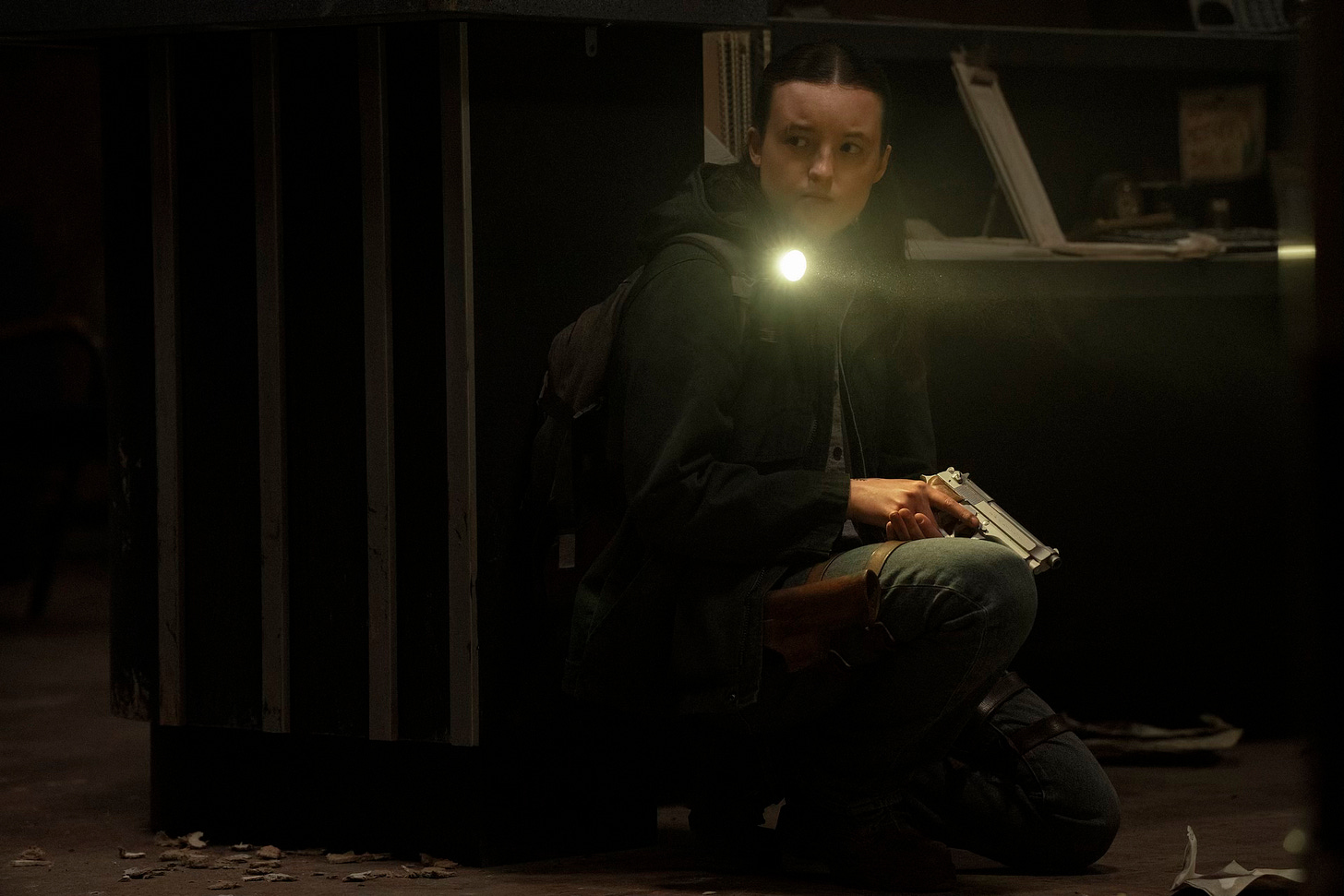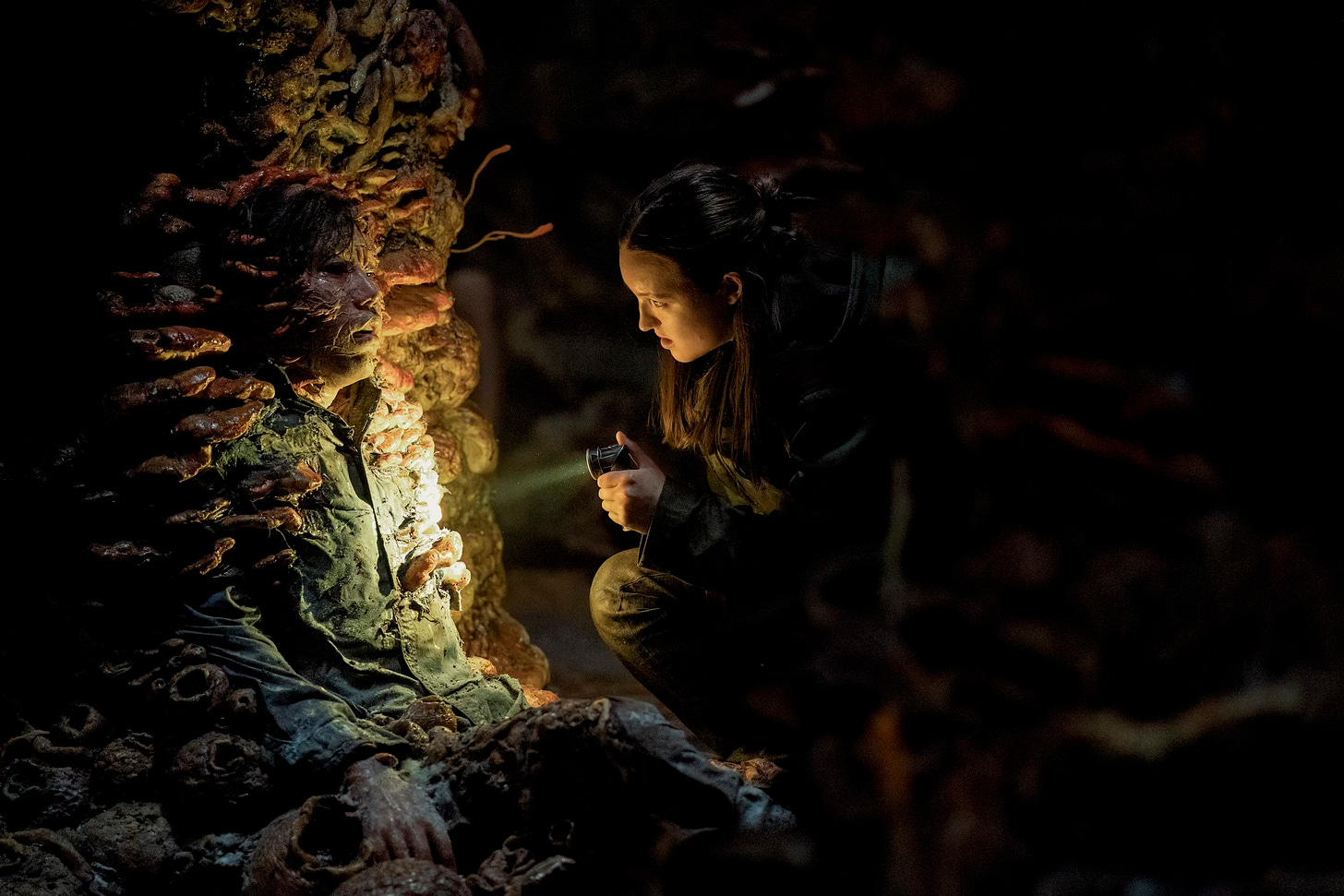
[This review contains spoilers for Season 2, Episode 5 of The Last of Us, “Feel Her Love.” It does not contain spoilers for the video game The Last of Us: Part II]
Early in this episode, we not only receive some details about Dina’s backstory, but we also get a parable of sorts. Dina, raised in this new world of the apocalypse, understands all the tropes and sarcastically downplays her trauma. The idea is that everyone has suffered so much in this world that you can suss out a person’s harrowing origin from only a handful of generalities. Life in the wasteland is pain, but Dina, Ellie’s true north at this point, provides a light: killing the raider who beat her mother and sister to death gave Dina a semblance of peace. We can see from Dina’s face that those events still haunt her (I feel like Isabela Merced is on track for a Best Supporting Actress nomination at this point), but going after the people who killed Joel makes sense. It will bring solace.
This is the fallacy that Ellie and Dina rest their mission on—the only way to accept Joel’s death is to murder the people who killed him. It won’t bring him back, but it will create the best sense of justice this world can provide. But as Ellie witnesses in “Feel Her Love,” this is a world that doesn’t lack for violence and retribution. If anything, she and Dina have left a place of peace and community and, in their quest for vengeance, come to a place where vengeance is king. The WLF and the Seraphites are locked in a cycle of bloodshed, and this episode beautifully uses setting to show Ellie witnessing acts of horrific violence without realizing she could become just as monstrous.
Writer and co-showrunner Craig Mazin does a terrific job of structuring the episode. While the cold open sets up the spores permeating level B2 of the hospital, once we get to Ellie and Dina, the episode is about a series of settings, each emphasizing the kind of hell they’ve wandered into. “Let’s go be reckless” becomes an understatement as Dina’s brains and Ellie’s bravado are already outmatched the second they’re trapped in a dark room with smart infected. It’s great that Jesse comes along with the save, but so early in the episode, we can already see that the duo is in over their heads, with Ellie’s best plan seeming to be, “It’s okay if they bite me a bunch.”
While the subway chase in last week’s episode left me a bit cold for how familiar and low-stakes it felt, I was far more impressed with this week’s run from the infected in the dark. Even though the stakes are still relatively low in that we’re unlikely to lose our characters in this fray, I admire how director Stephen Williams intentionally uses darkness here to create unease. Not only does it feel purposeful (as opposed to underlit), but the darkness emphasizes how our characters are out of their element. We’ve gone from the even lighting of Jackson to a place where the shadows belong to the infected.
The trio gets out of the darkness only to stumble upon a Seraphite ritual where they’ve captured a WLF member and eviscerate him to “release his sins.” In the span of roughly half an hour (tonight’s episode was surprisingly short relative to previous weeks, but the abbreviated time worked in its favor as it feels like there’s no padding here), Ellie and Dina have stumbled across Seraphites executed in the streets, a room full of smart infected, and now Seraphites ritualistically killing their enemies. The emerging theme would seem to be, “We have stumbled into a world of monsters,” and the horror on Ellie’s face conveys that she understands these violent places as hellish, and, in the cases of the WLF and Seraphites, man-made.

Then Mazin makes an ingenious little twist by separating Ellie from Dina and Jesse, and sending Ellie to the hospital, where she encounters Nora (Tati Gabrielle), one of Abby’s friends who held Ellie down while Abby murdered Joel. The way the switch flips is a perfect encapsulation of how witnessing monstrous behaviour outside yourself is horrific, but when the rage takes over, you can’t see the monster you’ve become. It’s a testament to Bella Ramsey’s range that she can go from playing the normalcy of being horrified by the Seraphites gutting a guy to a cold, dead stare once she encounters Nora. When Ellie chases Nora down the elevator shaft, she’s literally and figuratively going to a darker place.
What “Feel Her Love” shows isn’t just settings as fixed locations, but realms of transformation. These are not hells that exist separate from human existence, but hells that are created by human existence. What are the infected if not transformed humans? We saw it last week in how Isaac and Burton departed the fascism of FEDRA, but now have little issue with torturing a Seraphite for information. The symbolism of people consumed by cordyceps but kept alive so they can breathe out more spores couldn’t be more pointed in showing how you can be transformed into something monstrous and unrecognizable.
That’s the Ellie we see at the end of the episode. You can’t become the thing you hate and expect to remain the person you were. Joel was willing to let the whole world die if it meant saving Ellie’s life, and now her life is constantly at risk. She witnessed Abby beat Joel to death, and now Ellie is beating Nora to death. Dina’s story is about the promise of violence bringing peace, but the reality is that violence begets more violence.
Ellie borderline brags that she can’t become infected. And she’s right that she can’t become a zombie. But as “Feel Her Love” shows, there’s more than one way to become a monster.
Stray observations:
Considering that the game operates on a lead character/supporting character dynamic, I can’t help but wonder if there was a discarded idea in the game’s development where Ellie lets herself be bait for the infected while Joel pulls a lever or something.
In addition to the symbolism of the cordyceps in B2 as something that takes hold and transforms you, visually it was reminiscent of Alien, where the xenomorphs plaster their victims to the wall and they’ll eventually have a little xenomorph burst forth from their chest cavity. Weirdly, that seems preferable to being a mushroom zombie for all eternity.
I loved the sharp dichotomy to end the episode because, rather than just leaving us on Ellie’s violence, the emphasis is on Ellie’s transformation and how far she’s fallen by going down this path.
We encourage you to talk about the episode in the comments, but please refrain from video game spoilers. Having played the games should not be a prerequisite for watching the show.
The Last of Us airs Sunday nights at 9pm ET on HBO. Look for recaps of the latest episodes here later the same evening. Matt Goldberg is a film critic who lives and works in Atlanta. If you enjoyed this review, check out his newsletter, Commentary Track.

really good podcast on this episode
https://www.youtube.com/watch?v=4RrJj21u4OY